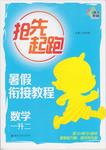题目内容
--“Where is Tom?”
--“He hasn’t come to school today, I think he ______be ill.”
| A.has to | B.should | C.may | D.can |
C
解析试题分析:英语中有些情态动词,通过使用不同的时态形式,可以表示“推测”的含义。1. 情态动词 + 动词原形:must + 动词原形,表示对现在的事实进行非常有把握的推测,一般用于肯定句。如:There must be something wrong. 一定是出了什么差错。may / might / can / could + 动词原形,表示对现在、未来事情发生的可能性的推测。此时, might, could 不表示过去,只是表示推测的语气更加不肯定。一般情况下, may, might 用于肯定句中; can, could 用于否定句、疑问句中。根据语境可知Tom没有到校,有可能生病了,表示肯定性不大的推测,故选C。
考点:情态动词表示推测
点评:关于表示推测的情态动词后面所接动词形式,有下列三种情况:若对此刻正在发生的事,接“be +现在分词”;若对现在或未来情况的推测,接动词原形;若对过去情况的推测,接“have +过去分词”。

 南大教辅抢先起跑暑假衔接教程南京大学出版社系列答案
南大教辅抢先起跑暑假衔接教程南京大学出版社系列答案Once there was an old man in a town. He always forgot a lot of things. So his wife always had to say to him, “Don’t forget this!”
One day he went on a long trip alone. Before he left home, his wife said, “Now you have all these things. They are what you need for your trip. Take care of your things during the trip.” He went to the station, bought a ticket and got on the train with it.
About half an hour later, the conductor began to see the tickets. He came to the old man and said, “Will you please show me your ticket?” The old man looked for his ticket in all his pockets, but he could not find it. He was very worried. “I can’t find my ticket. I really bought a ticket before I got on the train.” said the old man.
“I believe you bought a ticket. All right, you don’ t have to buy another one,” said the conductor kindly. “But how can I know where I'm going? I can't remember my station!” the old man said sadly.
1.The old man in the story was very .
|
A.kind |
B.poor |
C.forgetful(健忘的) |
D.sad |
2.Where is the ticket?
|
A.The old man forgot go buy it. |
|
B.The old man could not remember where it was. |
|
C.The old man showed it to the conductor. |
|
D.The old man’s wife took the ticket away. |
3.The old man bought the ticket he got on the train.
|
A.after |
B.before |
C.as |
D.when |
4.The conductor the old man.
|
A.didn’t believe |
B.laughed at |
C.believed |
D.felt sorry for |
5.The old man was sad because
|
A.he had to buy another ticket. |
|
B.he lost all the things his wife gave him. |
|
C.he did not know where he was. |
|
D.He did not know where he should get off. |
When Susan told me that she was terribly ill and probably would die. I cried. I didn’t understand why this happened to my best friend. Then Susan 35 me a red ribbon(丝带) without saying anything.
A month later, Susan was at a hospital about two hours away from where we lived. I asked my dad to take me to see her. I wanted to give my best friend a 36 . So I took out the ribbon and cut it into two pieces with scissors(剪刀). I put one in my pocket and the other in an envelope(信封), along with a letter explaining it to her. I told her to keep her 37 beside her bed, and I would keep mine near me, too. Then I went to the hospital one Friday afternoon, wondering (想知道) if the ribbon would 38 anything to her. I walked into the room and ran over to give her a big hug. Then I gave her a teddy bear and the envelope. We talked for a while and then she started looking 39 , so I asked her to get some rest and left the hospital. All the way home I 40 the ribbon close to me.
For the next four months, the ribbon was with me 41 I went: school, home, shopping, and at friends’ houses. Where I went, it went. It was something to remind(提醒)me that I had a friend who would 42 home very soon. Susan said that she wore her ribbon 43 her arm all the time and she always had it close to her when she was being tested and treated.
Finally, Susan came home! I was so happy. That night, I looked at the ribbon which was still with me. I had a feeling it would never 44 , that I would remember what had happened during the time she had been ill.
|
1. |
|
|
2. |
|
|
3. |
|
|
4. |
|
|
5. |
|
|
6. |
|
|
7. |
|
|
8. |
|
|
9. |
|
|
10. |
|